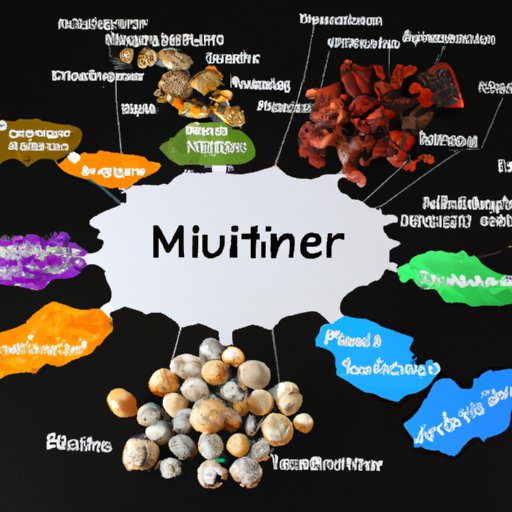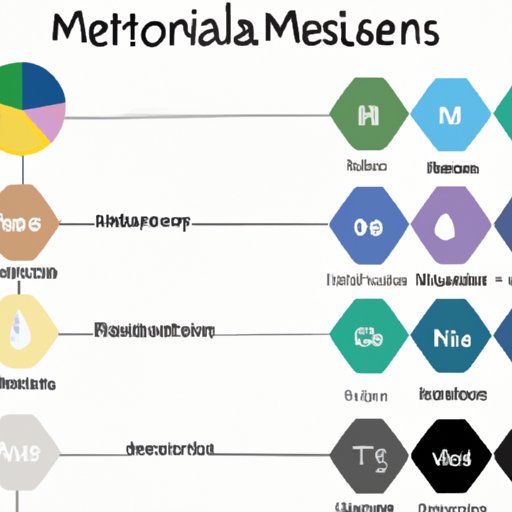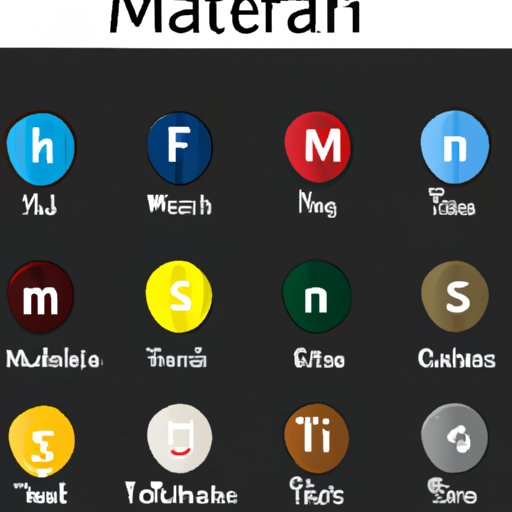Introduction
Minerals are essential nutrients that are found in a wide variety of foods. They are required for a range of physiological processes and play a key role in maintaining good health. In this article, we explore the importance of minerals in nutrition, their benefits, and ways to ensure optimal mineral balance in the diet.

Overview of Minerals and their Role in Nutrition
Minerals are naturally-occurring elements found in the earth’s crust. They are essential for life and are necessary for a range of bodily functions, including growth, cell production, and proper nerve and muscle function. Minerals cannot be synthesized by the body, so they must be obtained from dietary sources or supplements.
There are two types of minerals: macrominerals and trace minerals. Macrominerals, such as calcium, iron, magnesium, potassium, and sodium, are needed in larger amounts. Trace minerals, such as zinc, copper, selenium, iodine, and chromium, are needed in much smaller amounts.
Minerals are important components of a healthy diet. They have a variety of roles, including helping to regulate fluid balance, maintaining healthy teeth and bones, and aiding in the absorption of other nutrients. Without adequate mineral intake, it can be difficult to maintain good health.

Breakdown of Essential Minerals and their Benefits
Let’s take a closer look at some of the most important minerals and their benefits:
Calcium
Calcium is the most abundant mineral in the body, and it is essential for strong bones and teeth. It also plays a role in muscle contraction, blood vessel functioning, and nerve transmission. Good dietary sources of calcium include dairy products, leafy green vegetables, and nuts.
Iron
Iron is a mineral that helps transport oxygen throughout the body. It is essential for energy production, as well as normal growth and development. Iron-rich foods include lean red meats, fish, poultry, legumes, and enriched grains.
Magnesium
Magnesium is involved in more than 300 biochemical reactions in the body. It is important for muscle function, nerve transmission, and energy production. Good dietary sources of magnesium include dark leafy greens, nuts, seeds, and whole grains.
Potassium
Potassium is a mineral that helps regulate fluid balance in the body. It is also important for muscle contractions and nerve impulses. Foods high in potassium include sweet potatoes, avocados, bananas, and tomatoes.
Zinc
Zinc is a trace mineral that is essential for immune system health, wound healing, and normal growth and development. Good dietary sources of zinc include oysters, beef, crab, and fortified breakfast cereals.
Sodium
Sodium is a mineral that helps regulate blood pressure and fluid balance. It is found in table salt, but it is also present in many processed foods. Too much sodium can be detrimental to health, so it should be consumed in moderation.
Phosphorus
Phosphorus is a mineral that is important for strong bones and teeth. It is also involved in energy metabolism and cellular functioning. Good sources of phosphorus include dairy products, eggs, nuts, and beans.
Common Sources of Minerals in the Diet
Minerals can be found in a variety of foods. Plant-based foods, such as fruits, vegetables, and grains, are rich sources of minerals. Animal-based foods, such as meat, poultry, fish, and dairy products, are also good sources of minerals. Other sources of minerals include fortified foods, such as breakfast cereals, and dietary supplements.

The Impact of Mineral Deficiencies on Health
A deficiency in any mineral can lead to a variety of health problems. Common signs and symptoms of mineral deficiencies include fatigue, muscle weakness, poor appetite, and difficulty concentrating. If left untreated, mineral deficiencies can lead to more serious health complications, such as increased risk of infection and bone fractures.
Strategies for Increasing Mineral Intake
Making simple dietary changes can help increase mineral intake. Adding more plant-based foods, such as fruits, vegetables, and nuts, to the diet can provide a good source of minerals. Taking a daily multivitamin or mineral supplement can also help ensure adequate mineral intake.
Tips for Ensuring Optimal Mineral Balance in the Diet
Here are some tips for ensuring optimal mineral balance in the diet:
Monitor Mineral Intake
Keeping track of how much of each mineral you are consuming can help ensure that your diet is balanced. This can be done by reading food labels, tracking meals in a food journal, or using a mobile app.
Consider Food Combinations
Pairing different types of food together can help maximize mineral absorption. For example, combining a food high in iron with one that is high in vitamin C can help increase iron absorption.
Be Aware of Interactions
Certain medications can interfere with mineral absorption, so it is important to talk to your doctor about any potential interactions. Additionally, some minerals can inhibit the absorption of others, so it is important to consider which minerals may interact when planning meals.
Conclusion
Minerals are essential nutrients that play a key role in maintaining good health. By understanding their benefits and common sources, as well as making dietary changes and taking supplements, it is possible to ensure adequate mineral intake and maintain optimal mineral balance in the diet.
(Note: Is this article not meeting your expectations? Do you have knowledge or insights to share? Unlock new opportunities and expand your reach by joining our authors team. Click Registration to join us and share your expertise with our readers.)
